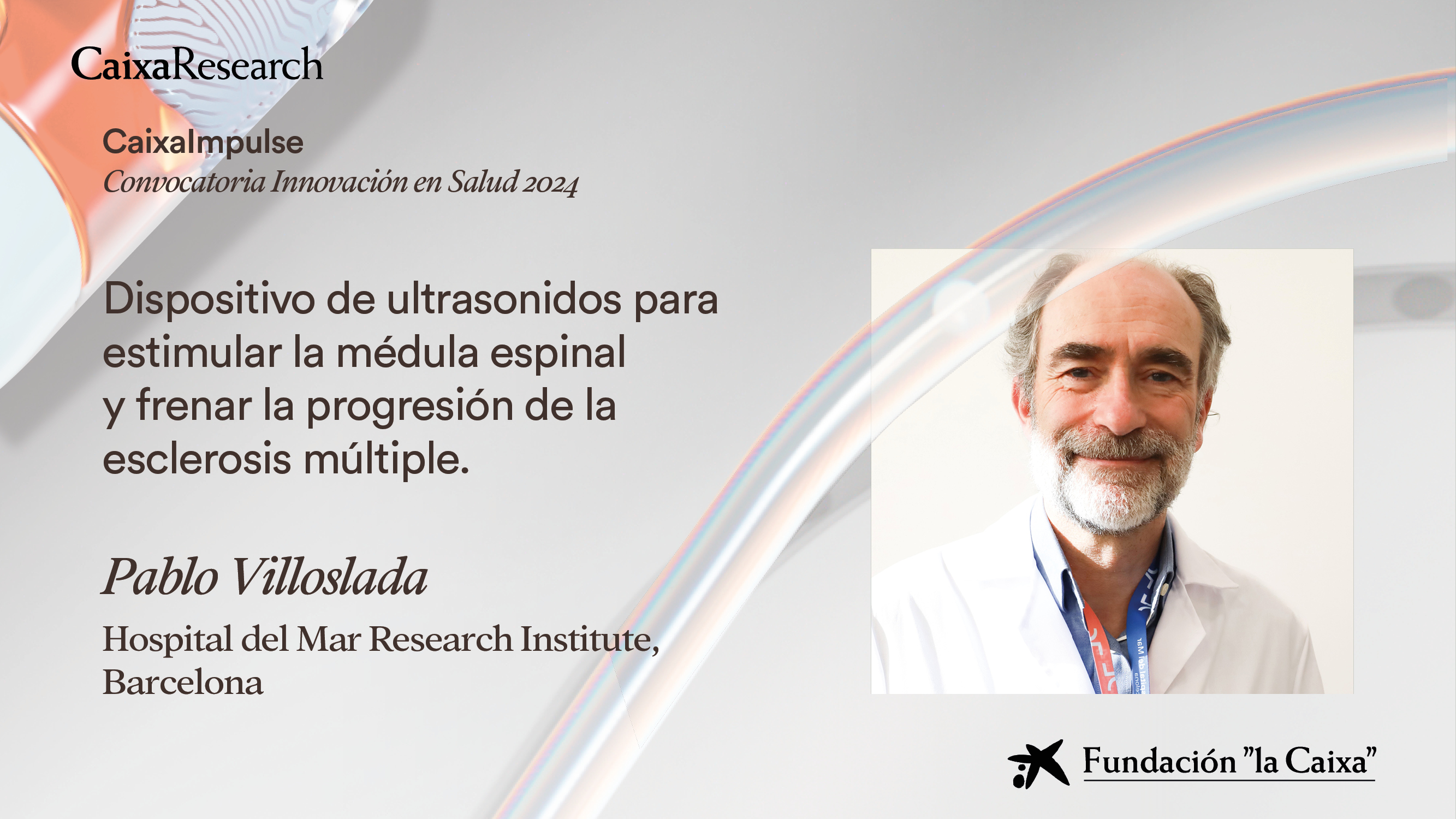
14/10/2024 - Press release
The "La Caixa" Foundation has concluded the 2024 call for the CaixaImpulse Innovació program, which supports 29 new biomedical projects from research centers, hospitals, and universities in Spain and Portugal. In total, the foundation will allocate 3.4 million euros to this initiative, which aims to accelerate the market entry of these innovations, bringing them closer to the patients who may need them. At the same time, CaixaImpulse Innovation promotes the creation of new products, services, and companies related to life sciences and health.
A project to develop an ultrasound device to stimulate the spinal cord and halt the progression of multiple sclerosis, led by Dr. Pablo Villoslada, is one of those selected in the new CaixaImpulse Innovació call by the "la Caixa" Foundation. The winning projects, chosen from more than 400 applications, were evaluated by six panels of experts and international professionals in this field. Among this year's selected projects are 17 led by researchers from 14 Catalan research centers.
By business area, 12 of the total 29 selected projects belong to the field of therapies, 9 to diagnostics, 7 to medical devices, and 1 to digital health. Regarding funding, the winners receive, depending on the maturity of the project, between 50,000 and 500,000 euros to develop it over the next two years. In this call, 16 projects entered phase 1 (up to 50,000 euros); 11, phase 2 (up to 150,000 euros); and 2, phase 3 (up to 500,000 euros). The program allows projects to progress to later stages with higher funding once specific development milestones are met and after evaluation by the committee.
Training and expert guidance for the projects
CaixaImpulse Innovation supports biomedical projects in innovation and transfer by helping researchers validate their assets and define their exploitation and valorization strategy to bring projects closer to the market. In addition to financial support, the program also provides mentorship, consultancy, and guidance from international experts in various areas of the innovation ecosystem.
Furthermore, researchers leading phase 2 projects will receive specialized training over four weeks on technology transfer, intellectual property legislation, investor presentations, and closing commercial agreements.
According to Ignasi López, Director of the Research and Health Institutions Relations Department at the "la Caixa" Foundation, "The results of this call reflect not only the abundance but also the exceptional quality of biomedical and health innovation projects in Spain and Portugal. We are proud to support them by offering both the necessary financial aid and the tools to help them enter the market with strength and security."
A device to halt the progression of multiple sclerosis
The project led by the head of the Systems Neurology and Neurotherapies Research Group and Head of the Neurology Department at Hospital del Mar, Dr. Pablo Villoslada, aims to develop a low-intensity focused ultrasound device to stimulate the spinal cord of patients with multiple sclerosis. In addition, the project seeks to create software capable of assessing the patient's anatomy and determining the most suitable application angle for the therapy. Ultimately, the goal is to evaluate the patients' tolerability of this treatment. The objective is to develop a prototype capable of administering low-intensity ultrasound in a personalized way that can halt the progression of the disease.
Multiple sclerosis is a chronic autoimmune neurodegenerative disease that damages the central nervous system, leading to loss of function in different parts of the body. The progression of this disease can result in permanent disability due to damage to the nervous system, particularly the spinal cord. In this regard, neurostimulation is a promising strategy to halt the progression of this condition, particularly through the application of focused ultrasound.
Currently, a therapy using high-intensity focused ultrasound to treat Parkinson's and tremors has already been approved. However, there is no device on the market to apply low-intensity ultrasound to the spinal cord, which is suitable for multiple sclerosis because it can modulate neuronal and glial cell activity. Previous studies in animal models have shown that repetitive application of this ultrasound promotes brain plasticity, prevents neuronal death and neuroinflammation, and supports nervous system repair.

Servei de Comunicació:
Marta Calsina(ELIMINAR)
Tel:
(+34) 93 316 06 80
Doctor Aiguader, 88
08226 Barcelona
© Institut Hospital del Mar
d'Investigacions MèdiquesLegal Notice and Privacy Policy | Cookie Policy | Site Index | Accessibility | Find Us | Contact